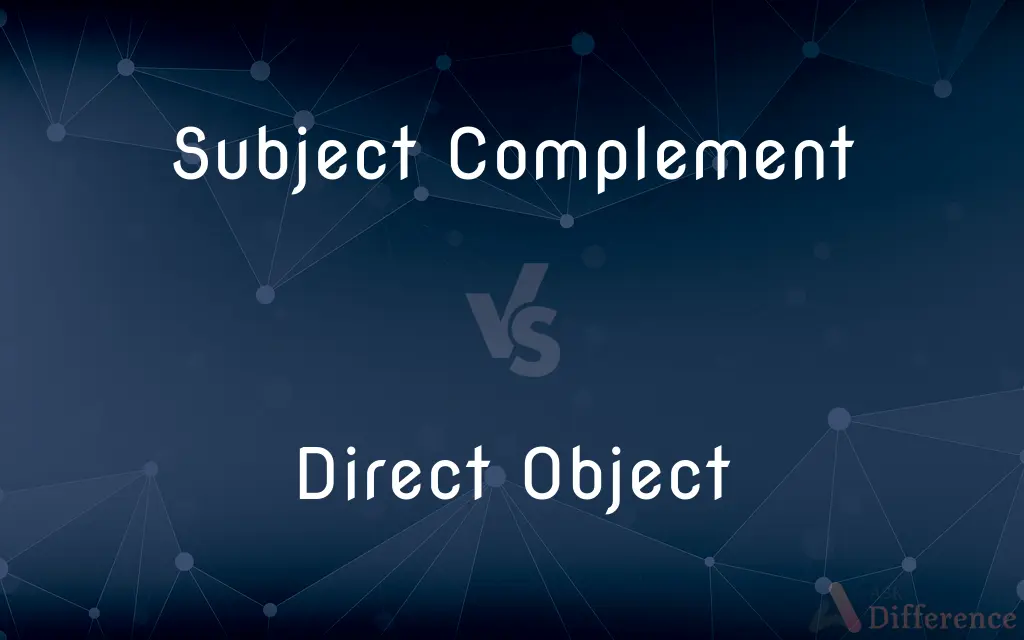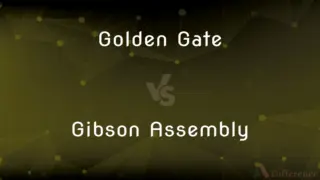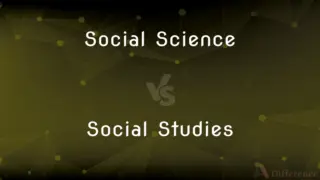Subject Complement vs. Direct Object — What's the Difference?
By Tayyaba Rehman — Published on November 15, 2023
A Subject Complement follows linking verbs and describes or renames the subject, while a Direct Object follows action verbs and receives the action of the verb.

Difference Between Subject Complement and Direct Object
Table of Contents
ADVERTISEMENT
Key Differences
Subject Complements and Direct Objects are essential components of sentence structure, though they serve different grammatical roles. A Subject Complement typically comes after linking verbs and either renames or describes the subject. For instance, in the sentence "The sky is blue," "blue" acts as a Subject Complement describing the "sky." On the other hand, a Direct Object follows an action verb and answers the questions "whom?" or "what?" about the verb. For example, in "She reads a book," the Direct Object "book" answers the question, "What does she read?"
Continuing on, not all sentences will contain a Subject Complement or a Direct Object. The presence of either depends on the verb and the overall sentence construction. While verbs like "be," "seem," or "become" can be followed by a Subject Complement, action verbs like "eat," "write," or "catch" can be followed by a Direct Object. For instance, in "She seems happy," "happy" is the Subject Complement, but in "She caught the ball," "ball" is the Direct Object.
Furthermore, a Subject Complement can either be an adjective, noun, or pronoun. It gives more information about the subject by either identifying or characterizing it. In contrast, the Direct Object is mostly a noun or pronoun, and it typically receives the verb's action directly. As in "The lecture was enlightening," the word "enlightening" serves as the Subject Complement, while in "I saw him," the word "him" functions as the Direct Object.
In essence, understanding the distinction between Subject Complements and Direct Objects can greatly enhance one's grasp of sentence construction and English grammar as a whole. Recognizing their roles can aid in parsing sentence meanings, constructing clear statements, and appreciating the nuances of the language.
Comparison Chart
Function
Renames or describes the subject.
Receives the action of the verb.
ADVERTISEMENT
Types of Verbs Followed
Linking verbs (e.g., is, seems, becomes).
Action verbs (e.g., eat, write, catch).
Typical Word Forms
Adjective, noun, pronoun.
Noun, pronoun.
Question Answered
Who or what is the subject?
Whom or what does the subject act upon?
Example
He is a teacher. ("teacher" is the complement)
She writes poems. ("poems" is the direct object)
Compare with Definitions
Subject Complement
Subject Complements complete the meaning of a subject and its verb.
The house is huge.
Direct Object
Direct Objects can be nouns or pronouns.
I invited him to the party.
Subject Complement
A Subject Complement provides additional information about the subject.
My brother is a doctor.
Direct Object
A Direct Object receives the action of a transitive verb.
She loves chocolate.
Subject Complement
A Subject Complement can be an adjective describing the subject.
The car is old.
Direct Object
Direct Objects can have modifiers accompanying them.
She plays the piano beautifully.
Subject Complement
Subject Complements follow linking verbs in a sentence.
The apple tastes sweet.
Direct Object
Direct Objects answer the questions "whom?" or "what?" regarding the verb.
He reads books.
Subject Complement
A Subject Complement can be a noun that renames the subject.
Lisa is the team captain.
Direct Object
Not all sentences have Direct Objects; only those with transitive verbs do.
She carries a bag.
Common Curiosities
What type of verbs are commonly followed by Subject Complements?
Linking verbs, such as "is," "become," or "seem."
Can a sentence have both a Subject Complement and a Direct Object?
Not typically, as they're associated with different types of verbs (linking vs. action).
What's an example of a Direct Object?
In "She feeds the dog," "dog" is the Direct Object.
Is "was" a linking verb that can have a Subject Complement?
Yes, like in "He was a chef."
Do all sentences contain a Direct Object?
No, only sentences with transitive verbs typically have Direct Objects.
How do I identify a Direct Object in a sentence?
Look for a noun or pronoun that answers "whom?" or "what?" after an action verb.
What does a Subject Complement do?
A Subject Complement either describes or renames the subject.
What's the primary role of a Direct Object?
A Direct Object receives the action of the verb in a sentence.
Can a Subject Complement be an adjective?
Yes, like in "The cake is delicious."
Can a Direct Object be at the beginning of a sentence?
While uncommon, in certain sentence structures or for emphasis, it's possible.
What happens if I remove a Subject Complement from a sentence?
The sentence may become incomplete or its meaning may change.
Do Direct Objects always follow the verb directly?
Typically, yes, but sometimes they may be separated by adverbs or other modifiers.
What's the difference between a predicate nominative and a Subject Complement?
A predicate nominative is a type of Subject Complement that renames the subject using a noun.
Can "her" be a Direct Object?
Yes, as in "I called her."
Are Subject Complements only used in declarative sentences?
No, they can be found in various sentence types, such as interrogative: "Is he a doctor?"
Share Your Discovery

Previous Comparison
Golden Gate vs. Gibson Assembly
Next Comparison
Social Science vs. Social StudiesAuthor Spotlight
Written by
Tayyaba RehmanTayyaba Rehman is a distinguished writer, currently serving as a primary contributor to askdifference.com. As a researcher in semantics and etymology, Tayyaba's passion for the complexity of languages and their distinctions has found a perfect home on the platform. Tayyaba delves into the intricacies of language, distinguishing between commonly confused words and phrases, thereby providing clarity for readers worldwide.











































